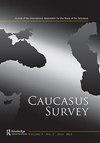俄罗斯外交战略中的高加索
IF 0.5
Q3 AREA STUDIES
引用次数: 5
摘要
摘要高加索地区一直是俄罗斯外交政策的形成地区。虽然北高加索地区仍然是俄罗斯最脆弱、政治最不稳定的地区,但南高加索地区是自19世纪初以来影响俄罗斯外交政策的最紧迫的安全挑战。在这篇文章中,我们认为,高加索地区有一个独特的环境,暴露了俄罗斯大战略的根本特征,即其硬实力和平衡的倾向,但与此同时,俄罗斯在这样一个动荡地区的地位也很脆弱。近几十年来,俄罗斯与北约在黑海的竞争性安全动态补充了与土耳其和伊朗的历史战略平衡。北约可能在南高加索地区扩大的威胁迫使莫斯科特别注意其防御的南部方向。随着乌克兰危机的爆发和俄罗斯对叙利亚的介入,局势变得更加复杂。历史经验告诉俄罗斯停止任何其他外交政策努力,直到高加索地区实现和平,或者至少不会威胁到不稳定的蔓延。就目前而言,这是一个非常遥远的前景。本文章由计算机程序翻译,如有差异,请以英文原文为准。
The Caucasus in Russian foreign policy strategy
ABSTRACT The Caucasus has always been a formative region for Russian foreign policy-making. While the North Caucasus has retained its position as Russia’s most fragile and politically instable region, the South Caucasus provided the most pressing security challenges shaping Russian foreign policy since the early nineteenth century. In this article, we argue that the Caucasus comprises a distinct environment that exposes the underlying features of the Russian grand strategy, namely its propensity to hard power and balancing, and yet, at the same time, the fragility of Russia’s position within such a turbulent region. The historical strategic equation with Turkey and Iran has in recent decades been supplemented with a competitive Russia-NATO security dynamic in the Black sea. The threat of possible NATO enlargement in the South Caucasus forces Moscow to draw particular attention to the southern direction of its defences. The situation has become even more complicated with the onset of the Ukraine crisis and Russian engagement in Syria. Historical experience teaches Russia to cease any other foreign policy endeavours until the Caucasus is at peace or at least does not threaten a spill-over of instability. For now, this is a very distant prospect.
求助全文
通过发布文献求助,成功后即可免费获取论文全文。
去求助
来源期刊

Caucasus Survey
Arts and Humanities-History
CiteScore
1.30
自引率
9.10%
发文量
4
期刊介绍:
Caucasus Survey is a new peer-reviewed, multidisciplinary and independent journal, concerned with the study of the Caucasus – the independent republics of Armenia, Azerbaijan and Georgia, de facto entities in the area and the North Caucasian republics and regions of the Russian Federation. Also covered are issues relating to the Republic of Kalmykia, Crimea, the Cossacks, Nogays, and Caucasian diasporas. Caucasus Survey aims to advance an area studies tradition in the humanities and social sciences about and from the Caucasus, connecting this tradition with core disciplinary concerns in the fields of history, political science, sociology, anthropology, cultural and religious studies, economics, political geography and demography, security, war and peace studies, and social psychology. Research enhancing understanding of the region’s conflicts and relations between the Russian Federation and the Caucasus, internationally and domestically with regard to the North Caucasus, features high in our concerns.
 求助内容:
求助内容: 应助结果提醒方式:
应助结果提醒方式:


